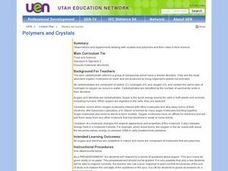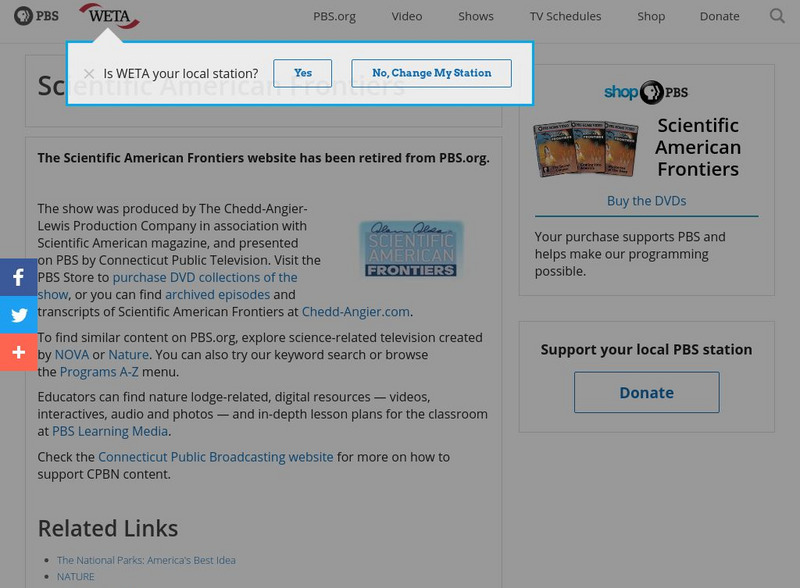Curated OER
Blood Business
Young scholars identify the different kinds of blood. In this biology lesson, students investigate the antigens, agglutinins and Rh factor using their own blood. They use Punnett squares to predict blood type of offspring.
Curated OER
What Happens When A Cell Divides?
Students investigate the cycle of mitosis. For this biology lesson, students discuss the different stages of mitosis through cell reproduction. They further their investigation through laboratory analysis.
Curated OER
Polymers and Crystals
Learners experiment with crystals and polymers and examine their roles in food science.
Curated OER
Virus Tracker
Sixth graders will simulate the spread of a virus such as HIV through a population by "sharing" (but not drinking) the water in a plastic cup with several classmates. Although invisible, the water in a few of the cups will already be...
Curated OER
Cells and Cancer
Students idenitfy that cancer is a growth of mutated cells and that cancer cells are only one type of cell that causes disease in our body. They also identify that all eukaryotic cells contain a nucleus, cytoskeleton, and a cell...
Curated OER
Technology
High schoolers recognize descriptions of different types of biotechnology currently being used. They form persuasive arguments for or against that particular type of biotechnology.
Curated OER
Viruses and Host Evolution
Young scholars research viruses and their effects on the evolution of a rabbit population. They complete a teacher created worksheet of questions on their research. They present their research to classmates.
PBS
Pbs Learning Media: Dna Structure and Function: Decoding Watson
Discover how the structure of DNA relates to its hereditary function in these videos from the American Masters film Decoding Watson. The first video, "DNA Structure and Function," [2:07] can be used with all middle and high school...
Howard Hughes Medical Institute
Hhmi: Bio Interactive: Dna: Teacher Guide
This curriculum guide assists in filtering through the vast available resources from BioInteractive and HHMI and organizes the material according to various topics related to DNA, including DNA structure, replication, and repair.
Other
My Science Box: Dna Models
Hands-on lesson in which students play with puzzle pieces representing the DNA molecule to discover the molecular structure of DNA.
Alabama Learning Exchange
Alex: Dna Technology Project
Students will research current uses for DNA technology. Students identify a variety of ways that DNA technology can be used. Finally, the students create a DNA Technology project using technology. This lesson plan was created as a result...
TeachEngineering
Teach Engineering: Imaging Dna Structure
Students are introduced to the latest imaging methods used to visualize molecular structures and the method of electrophoresis that is used to identify and compare genetic code (DNA). Students should already have basic knowledge of...
Concord Consortium
Concord Consortium: Science of Atoms and Molecules: Nucleic Acids and Proteins
Through this activity, students work with macromolecules, proteins and nucleic acids. The focus is on the atomic structure of proteins, how linear polymers are made, and the surface charges of the resulting polymers. . Multiple-choice...
National Health Museum
Access Excellence: Making a Phylogenetic Tree Lesson Plan
Constructing phylogenetic trees may be a daunting task for students, but this lesson plan is a simulation of what molecular biologists must do to determine relationships. This plan is for students who have a good grasp of DNA structure...
National Health Museum
Access Excellence: Molecular Biology/primate Phylogeny
This lesson plan involves comparison of amino acids to create a phylogenetic tree of primates. Learners will also use other species information to draw conclusions about evolutionary relationships.
National Health Museum
Nhm: Amino Acid Sequences Show Evolution
This lesson plan focuses on differences in the amino acid sequence of hemoglobin and myoglobin proteins. They use the number of differences to create a phylogenetic tree.
PBS
Pbs Teachers: Scientific American: Never Say Die: How to Make a Nose
Investigate breakthroughs in stem cell research, and explore the structure and function of a DNA molecule. Create a model of a DNA from tagboard.
PBS
Pbs Teachers: Scientific American: Never Say Die: Wisdom of the Worms
Explore scientific research in gene mapping, and discover the way genes regulate aging in people. View actual DNA after isolating it from onion cells.
Other popular searches
- Dna Structure
- Dna Structure and Function
- Dna Structure Powerpoint
- Dna Structure Model
- Dna Structure Concept Map
- Dna Structure Worksheets
- Modeling Dna Structure
- Dna Structure Paper
- Dna Structure Animations
- Dna Structure Lesson Plans
- Dna Structure Base Pair
- Discovery of Dna Structure













